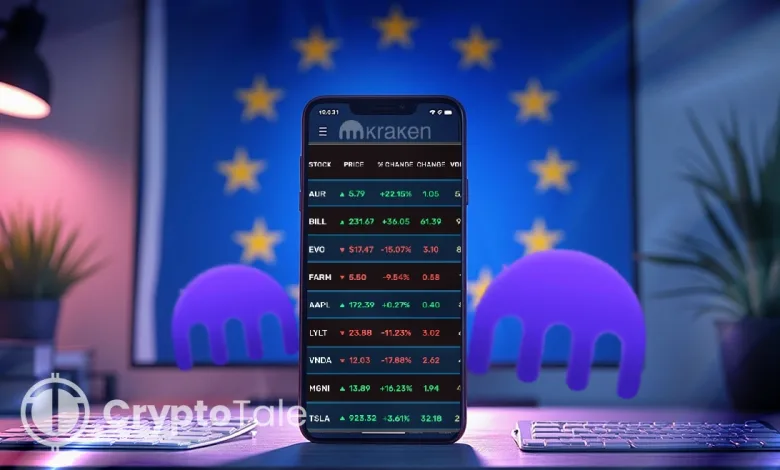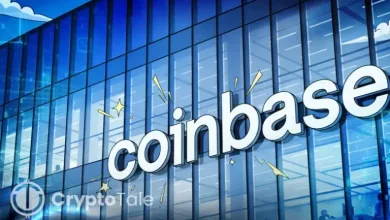Kraken Brings xStocks to Europe as Nasdaq Seeks Token Entry

- Kraken expands xStocks across Europe by trading over 60 leading US company equities.
- Robinhood and Gemini join the race to capture demand for tokenized equities in Europe.
- Nasdaq files with the SEC to trade securities using existing rules for listed assets.
Kraken has expanded its tokenized stock service, xStocks, to investors across the European Union, marking a shift in capital markets. The crypto exchange now offers on-chain trading of over 60 U.S. equities, including Apple, Meta, Tesla, and GameStop, available 24 hours for five days a week. This expansion provides European users with direct exposure to American markets without the barriers of traditional brokers, cross-border restrictions, or delays tied to U.S. settlement processes.
The service is designed to simplify market access by eliminating intermediaries while extending trading hours beyond Wall Street’s timetable. According to Kraken, this expansion aligns with its strategy to strengthen its global presence while benefiting from Europe’s maturing regulatory environment. Under the MiCA, Europe has provided clearer rules that encourage tokenized asset offerings, a framework currently absent in the United States.
The European Kraken users can trade tokenized certificates tracking U.S. equities, which allows them to have flexibility in holding, transferring, or self-custodying such assets across compatible platforms. The exchange emphasized that the feature would give clients the autonomy to control tokenized assets without involving third-party custodians.
Mark Greenberg, Kraken’s global head of consumer, stated that the decision was a natural step given the company’s growth strategy and European presence. He explained that U.S. market exposure had been “unnecessarily challenging” for years, and xStocks now removes many of those barriers.
Competition Among Exchanges Intensifies
Kraken’s move comes during increasing competition among crypto-native platforms racing to serve European investors. Earlier this summer, Robinhood introduced its own tokenized stocks and exchange-traded funds for EU customers, offering access to more than 200 assets. Its platform also expanded tokenization to private companies such as OpenAI and SpaceX, although legal complexities remain around those listings.
By contrast, the offering by Kraken concentrates solely on publicly listed securities, which is more transparent and eliminates the possible risks of the privacy of a private company being tokenized. This difference indicates divergent approaches to exchanges, each of which hopes to gain the attention of investors by various methods of tokenization of assets.
Gemini is also in the European market, competing in the same space. These trends reveal the pace with which crypto platforms are taking advantage of regulatory clarity in the EU, acting upon it more rapidly than their U.S. counterparts to produce novel products.
Nasdaq Signals Its Intent to Compete
On September 8, 2025, Nasdaq submitted a filing to the U.S. Securities and Exchange Commission seeking approval to tokenize securities under existing rules. The proposal would allow equities and exchange-traded products listed on the exchange to be traded in tokenized form with identical rights and identifiers. Investors could then choose between tokenized settlement or conventional settlement through the Depository Trust Company, maintaining consistent shareholder protections.
Nasdaq argued that tokenized securities should be listed on established exchanges rather than emerging “siloed trading venues,” reflecting its view that legacy markets should oversee this innovation. The exchange also raised concerns about European offerings, noting that many do not provide full shareholder rights, such as voting or claims on corporate assets.
Related: Kraken Expands Into Prop Trading With Breakout Acquisition
In reaction, Kraken Mark Greenberg said that new models will not be homogeneous, adding that there will be space between walled, KYC-only models such as Nasdaq and permissionless, interoperable models such as xStocks. His remarks imply a contrast between the vision of how the structure of tokenized markets should be, where traditional exchanges are concerned with regulatory compliance, and where crypto platforms would prefer open access.
The comparison of these approaches depicts two directions of tokenized securities – a route followed by conventional institutions that adopt blockchain within their existing frameworks, and a route followed by crypto companies that promote the idea of decentralized accessibility. Europe, under the auspices of MiCA, is the testing ground, with these competing models rapidly developing as U.S. regulators are cautious.




